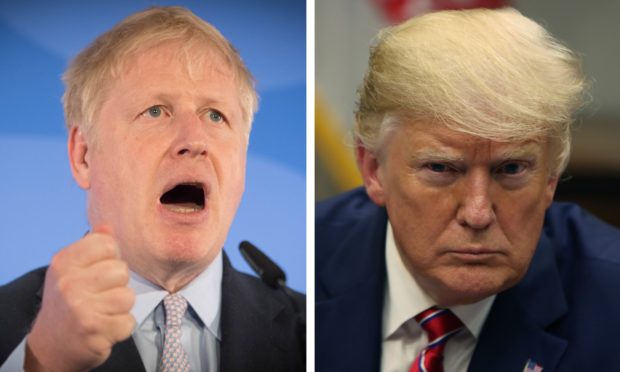Sir, – It is difficult during the current health crisis to concentrate on other matters.
However, I feel it is necessary to draw your readers’ attention to the fact the government in Westminster is carrying on arranging trade deals with other countries as part of their Brexit strategy.
For instance, this week there is the second reading of a Trade Bill that will facilitate negotiations with the US.
US President Donald Trump has already said that “everything is on the table” including the NHS. He has made clear he wants the market opened up to US drug companies, precipitating a rise in prices the NHS would have to pay.
He is also interested, as is Nigel Farage, in opening up Britain to US insurance companies as a way of funding the NHS in the future.
When pressed both Prime Minister Boris Johnson and Trade Minister Liz Truss said they will protect the NHS. However, they have failed to provide details of how this would be done.
We must be aware, also, that although the Scottish Government has responsibility for the NHS in Scotland any trade deal negotiated with Trump, or anyone else, by Johnson would override any protections the Scottish Government may want to put in place.
This is a serious matter.
At a time when we have seen the value of the NHS in this crisis it is important to ensure it is not sacrificed/privatised in any trade deals.
If we want to protect the NHS we should be asking the government in Westminster to insert a precise and clear clause in the Trade Bill to exclude the NHS from the negotiations.
So far they have refused to do this.
The Bill will need to go through another two parliamentary stages yet, so all is not lost.
If you value the NHS please contact your MP and to press for a protection clause for the NHS in the Trade Bill.
Now more than ever we need to protect the NHS for the present and the future.
Brian Batson.
7 Lour Road,
Forfar.
Scotland left in limbo with virus
Sir, – I was starting my career in 1968 with what is now GlaxoSmithKline, when Hong Kong flu emerged.
It spread without restrictions on economic activity until a vaccine became available four months after it started.
The virus returned during the following 1969/1970 flu season and remains in circulation today.
From July 1968 until it faded in the 1969-70 winter, one million died worldwide, including 80,000 in the UK.
Though that death toll was much higher in real and percentage terms, there was none of the government panic which led to the catastrophic damage to the economy we see today.
Lockdown was enacted in March on a forecast of 500,000 deaths in the UK and a claim our hospitals couldn’t cope with such a preposterous figure.
Today our intensive care units are at 40% capacity yet Scotland remains paralysed.
The blame rests with epidemiology’s computer modellers who exhibit the hysteria of climate science.
Dr John Cameron.
10 Howard Place,
St Andrews.
Would Starmer ignore advice?
Sir, – It is easy for the opposition leader to trawl through past government statements, quote one slightly out of context and put the prime minister on the back foot.
Then we discover the example that “it was very unlikely that people receiving care in care homes will become infected” was not just a government statement – it was the expert opinion in February of the independent quango Public Health England in the context of face masks not being required in general within care home settings, when there appeared to be no community transmissions.
PHE changed that advice only on March 13.
How would the Labour Party have reacted if the government had adopted a different policy from that advised by its independent experts?
They did not propose earlier tougher lockdown measures, or different care home procedures, or testing, whatever Keir Starmer now implies.
The whole point of PHE is to prepare for and counter mass infections like coronaviruses.
It is however an own-goal of the government to remove the chart of comparative death numbers from the press conference, rather than replacing it with one relating deaths to populations – which would show Belgium highest; France, Italy and Spain higher than the UK; and the USA at half the UK level.
John Birkett.
12 Horseleys Park,
St Andrews.
Robbing Peter to pay Paul
Sir, – For once I agree with your contributor Les Mackay; a Citizen’s Income is desirable (Citizen’s income would protect everyone, Courier, May 13).
My caveat is that it must be financed from land values. These are community-created and should no longer be trousered by corporate landlords, or even individual ones like me.
To what extent land values should be used for state revenue or for a Citizen’s Income) will be a matter for the electorate.
If a Citizen’s Income is not financed that way then, on a Smithian analysis, the money will ultimately have to come from the other primary factor of production: people’s work.
And then a Citizen’s Income will simply be robbing Peter to pay Paul.
George Morton.
29 Hudson Road,
Rosyth.










